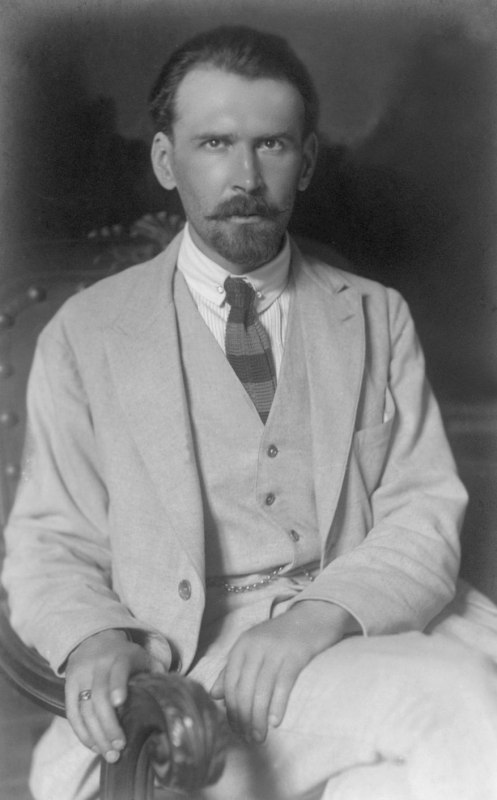Nikolai Sergejewitsch von Trubetzkoy, Prof. Dr.
Begründer der Phonologie
Honors
| Ehrung | Titel | Datierung | Fakultät | |
|---|---|---|---|---|
| Commemorative Plaque of Faculty | 1969 | Faculty of Philosophy |
Die Vorstände des Instituts für Slavische Philologie und Altertumskunde, Günther Wytrzens, Josef Hamm, František Václav Mareš, stellten am 12. November 1968 den Antrag an das Dekanat der Philosophischen Fakultät,
Daraufhin beschloss das Professorenkollegium der Philosophischen Fakultät am 13. Jänner 1969 einstimmig, die Aufnahme des Namens von Trubetzkoy beim Akademischen Senat zu beantragen. Der Senat stimmte dem Antrag in seiner Sitzung vom 25. Jänner 1969 einstimmig zu. Am 17. Februar 1969 wurde die Universitäts-Gebäudeverwaltung ersucht, die Gravierung zu veranlassen. |
|
| Monument in arcaded court | 1974 | Faculty of Philosophy |
- Slavic Studies
- Linguistics
- Ethnology
- Faculty of Philosophy
Trubetzkoy, who was the son of a university professor and a descendant of a Russian aristocratic family, attended the 5th state secondary school in Moscow and then began studying philosophy and linguistics at the University of Moscow. In 1913 he obtained the “first degree university diploma” (recognized as a doctorate at the University of Vienna in 1931) with the paper “Forming the future tense in Indo-Germanic languages”. In 1913/14 he continued his studies at the University of Leipzig with the help of a scholarship from the Russian ministry of education. In 1916 he habilitated for general and comparative linguistics and Old Indic at the University of Moscow, where he worked as a private lecturer in 1916/17. Since he was a Russian aristocrat, he was forced to flee from the Bolshevist revolution in 1917, but was able to get a temporary position as a “state lecturer” for general and comparative linguistics at the University of Rostov-on-Don in 1918/19. At the same time Trubetzkoy also taught as a professor at the private women’s university in Rostov as well as at the teacher training college in Novocherkassk. In 1920 he began working as a contract professor at the University of Sofia.
Trubetzkoy became a full professor for Slavic philology and (co-)director of the Slavic seminar at the University of Vienna in December 1922. The faculty had suggested Erich Berneker, professor at the University of Munich, in first place and Reinhold Trautmann, professor at the University of Königsberg, in second place for this position. Since the Prussian and Bavarian governments had convinced them through concessions to stay at their universities, Trubetzkoy received the position. He also was made a member of the teaching exam commission for secondary schools in Vienna as a subject examiner for Slavic languages.
In March 1938 Trubetzkoy was dealing with severe health problems, which is why, after the “Anschluss”, he asked for a leave of absence for the rest of the summer semester 1938. The dean’s office approved this request. However, the National Socialists had misgivings against him, which is not least attributable to his Russian origins. Trubetzkoy’s school in Vienna was furthermore “notorious as Russophile” according to Irene Maria Leitner.
Meanwhile, Trubetzkoy’s wife informed the rectorate at the end of March on behalf of her husband that the documents needed for his “Ariernachweis” (“Aryan Certificate”) had remained in Russia and that it was as good as impossible to get copies from the registry books, since most churches did no longer exist. There is no indication that Trubetzkoy would have not been considered “Aryan” according to the “Nuremberg Race Laws” in the files, although Tanzmeister claims that Trubetzkoy had been “of Jewish descent”.
According to Mühlberger, the process to remove Trubetzkoy from office had already been set in motion. The dean of the philosophical faculty, Viktor Christian, however, wrote that although “concerns about his political reliability have been raised in influential places”, no measures would be taken against him. On June 25th, 1938, Trubetzkoy suffered heart failure and passed away. Only a month earlier the philosophical-historical class at the Royal Academy of Sciences in Amsterdam had elected him a member.
The confiscation of Trubetzkoy’s scientific inheritance was to become an issue even after his death. The Hauptstelle Kulturpolitisches Archiv (central office of the cultural-political archive) advocated a return of the material in April 1939: In a letter from that month it was mentioned that a “German scientific journal” wanted to publish a report on the confiscation and that the central office had only been able to convince the French editorial staff to postpone the publication. The head of the Reich central office pointed toward the negative impression that such a report would make abroad. Whether and when the confiscated material was returned is not documented.
Trubetzkoy is considered the founder of phonology and thus expanded linguistics by this new field. Among other things, he did research on Russian folk poetry, Caucasian languages and the languages of the Finno-Ugric peoples of Russia.
He was a full member of the Academy of Sciences in Vienna, member of the Permanent Commission for Russian Dialectology in Moscow, the Linguistic Association in Prague and the Sociéte Linguistique in Paris.
Archiv der Universität Wien, Philosophische Fakultät, Personalakt 2065 (Issatschenko) und Personalakt 3479 (Trubetzkoy). |
Archiv der Universität Wien, Philosophische Fakultät, GZ 659-1937/38. |
Bundesarchiv Berlin, NS 15/35, MF 88353. |
Österreichisches Staatsarchiv/Allgemeines Verwaltungsarchiv, Bestand Unterricht, Personalakt Trubetzkoy.
Zuletzt aktualisiert am 01/17/24

